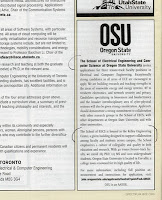 PHOTO: Print ad for hiring Oregon State University electrical and computer science professors at OSU as printed in the professional magazine IEEE Spectrum, Dec. 2011, p. 56. The ad provides the URL link jobs.oregonstate.edu/applicants/Central?quickFind=59555 for more position details.
PHOTO: Print ad for hiring Oregon State University electrical and computer science professors at OSU as printed in the professional magazine IEEE Spectrum, Dec. 2011, p. 56. The ad provides the URL link jobs.oregonstate.edu/applicants/Central?quickFind=59555 for more position details.
According to the above ad from The School of Electrical Engineering and Computer Science at Oregon State University, it "invites applications for three tenure-track faculty positions" from "exceptionally strong candidates." Their wording is apparently meant to meet the directive of the University President Ed Ray who is trying to upgrade the OSU faculty's "pedigree" as well as to grow enrollment numbers past the current university-wide total of 25,000 students. The ad states that the school has 40 tenured or tenure track faculty members and they enroll 185 PhD, 125 MS and 1200 undergraduate students.
My personal interest in this is that I received a graduate degree from this university department decades ago and left to do research engineering in the corporate world, including a stint on the Stanford University campus where I met professors from major league engineering universities, such as MIT, UC Berkeley, etc. All of these professors, including the ones still employed by a university, complained about the hardball politics of academia.
The chief complaint was the focus on doing research, the so-called "publish or perish" model, which prevented professors from also doing a good job of teaching university students. Therefore, it is amusing to see the OSU EECS hiring position description emphasize the teaching aspect of the job, when it is clear that a failure to publish research will be what determines tenure.
Not being a part of academia, I can enjoy watching the politics of academia, but I still care about the importance of good research and teaching at the same time. In my experience, there are few professors who can do both successfully. I suspect this is why many top universities have concentrated their faculty on research and have hired part-time "adjunct faculty" to do the job of teaching that few researchers want to do. "Adjunct faculty" members are usually employed full-time at a local company and they are often popular with students because they are not stuck up in the theoretical clouds like top researchers tend to be.
Decades ago, both the strength and weakness of OSU amongst employers of engineers was that many of the professors had at least one degree from OSU and many had industry experience. The strength to this was that the professors had a certain pride in teaching students who were mostly from Oregon and they had a real knowledge of real world engineering problems. They transferred their knowledge to students, which made graduates very popular to employers who wanted to hire graduates that were practical problem solvers instead of just being theoretical academics. The weakness came in that these professors were rarely able to be recognized worldwide for their research because other researchers outside of Oregon dismissed the university as being a bunch of agricultural hicks not worthy of recognition.
I fully support the need for OSU to recruit world-class faculty for doing important research that will be recognized worldwide. However, I hope that OSU will not lose its reputation for being a place to hire engineering graduates who can be practical in solving real world problem instead of just being theoretical academics.